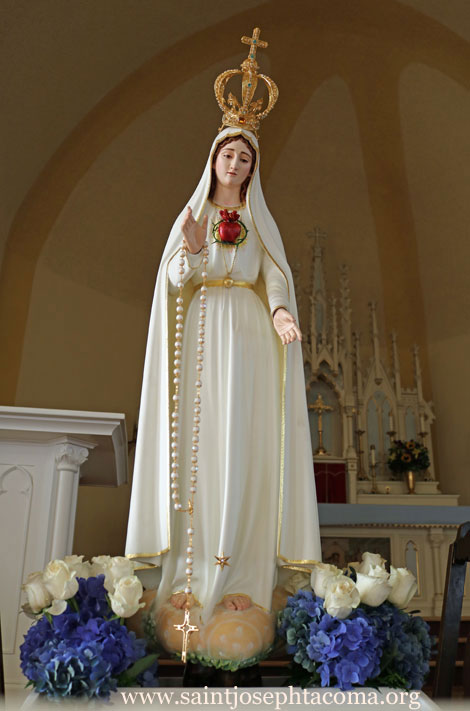Frequently Asked Questions
How should I dress for Mass?
The dress code for St. Joseph is that of any House of God. It is expected that during the liturgies, people wear clothes that are respectful to themselves and others, and are a reflection of the fact that they are in the House of God. (Are shorts or sleeveless tops really your Sunday best? If not, then they would not be appropriate for the Mass.) So think: “Sunday Best” when picking out clothes to wear to Mass.

Do I need to cover my head during Mass?
Men are not to wear head coverings while inside; this is simply proper etiquette (see also 1 Cor. 11:4). Women traditionally wore head coverings while in the presence of the Blessed Sacrament, so when entering the church, they would simply put on a head covering, whether a veil or hat. St. Paul is very clear about women covering their heads while praying (1 Cor. 11:5), but more than this, a woman is a sacred vessel, an ark, as Our Lady is the Ark of the New Covenant. Sacred vessels are typically covered, like the tabernacle, the altar, the ciborium, the chalice, etc., and so in recognition of the dignity of a woman; she covers her head and veils the beauty which may be a distraction for prayer. The policy for St. Joseph parish is that it remains the choice of the individual woman as to whether or not she covers her head.
Is there anything special that I should know about receiving Holy Communion?
When approaching the communion rail, you should be in a proper state of mind and grace in order to receive worthily. You must be a practicing Catholic, in good standing with Holy Mother the Church, having already received instruction on the Eucharist. You should be in the state of grace, such that you have not committed a mortal sin since your last good confession. When presenting yourself to receive Holy Communion, kneel (if able) upon the kneeler and hold your hands together and tilt your head back slightly, open your month, and allow the priest to place the Eucharist upon your tongue. If you are unable to kneel, you may present yourself standing, but communion in the Extraordinary Form is only upon the tongue and is never to be received in the hand. There is no verbal response at communion. The priest will say (in Latin), “May the Body of our Lord Jesus Christ preserve your soul for everlasting life, Amen.” Notice that the priest says “Amen”; therefore, you DO NOT SAY “AMEN.” Simply sign yourself with the cross silently and return to your seat recollected.

What are the current laws of fast and abstinence?
The current practice of fast and abstinence falls under the code of Canon Law. The law of abstinence begins on one's 14th birthday and is not lifted due to older age. The days of abstinence are Ash Wednesday and all the Fridays of Lent. The law obliges abstention from flesh meat.
Days of penance apply to all the Faithful and include the season of Lent and Fridays outside of Lent. There is also the National Day of Penance (January 22nd) in reparation for the U.S. Supreme Court’s Roe v. Wade decision, legalizing abortion.
The practice for the laws of Fasting applies to everyone aged 18-59, inclusive. One full meal is permitted and two other meals may be taken which, when combined, are less than a full meal. The days of fast are Ash Wednesday and Good Friday.
The obligation to do penance is lifted on Fridays which are also celebrated as a solemnity, such as the Feast of the Sacred Heart of Jesus.
How long should one fast before receiving Holy Communion?
The Fast for Holy Communion is one hour before the reception of the Holy Eucharist. Those who are able to maintain the previous discipline of the three-hour fast (or the fast from midnight) are encouraged to do so.
"Do not try to please everybody. Try to please God, the angels, and the saints - they are your public."
~ St. John Vianney ~
Copyright © 2015-2024 Saint Joseph Catholic Church, Latin Mass Parish, 602 S 34th St., Tacoma, WA 98418. All Rights Reserved.
Website comments or questions: info@saintjosephtacoma.org


